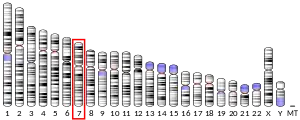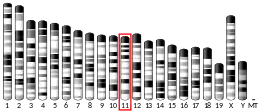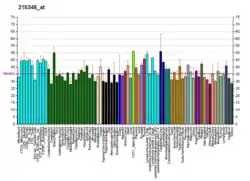ADCY1
Adenylyl cyclase type 1 is an enzyme that in humans is encoded by the ADCY1 gene.[5][6]
This gene encodes a form of adenylyl cyclase expressed in the brain. A similar protein in mice is involved in pattern formation of the brain.[6]
Function
ADCY1 is a calmodulin-sensitive adenylyl cyclase. In terms of function, It may be involved in regulatory processes in the central nervous system; specifically, it may play a role in memory acquisition and learning. It is inhibited by the G protein beta and gamma subunit complex.[7]
References
- GRCh38: Ensembl release 89: ENSG00000164742 - Ensembl, May 2017
- GRCm38: Ensembl release 89: ENSMUSG00000020431 - Ensembl, May 2017
- "Human PubMed Reference:". National Center for Biotechnology Information, U.S. National Library of Medicine.
- "Mouse PubMed Reference:". National Center for Biotechnology Information, U.S. National Library of Medicine.
- Villacres EC, Xia Z, Bookbinder LH, Edelhoff S, Disteche CM, Storm DR (May 1993). "Cloning, chromosomal mapping, and expression of human fetal brain type I adenylyl cyclase". Genomics. 16 (2): 473–8. doi:10.1006/geno.1993.1213. PMID 8314585.
- "Entrez Gene: ADCY1 adenylyl cyclase 1 (brain)".
- "Gene Cards: ADCY1 Gene". Retrieved 2012-12-30.
External links
- Human ADCY1 genome location and ADCY1 gene details page in the UCSC Genome Browser.
Further reading
- Osawa S, Dhanasekaran N, Woon CW, Johnson GL (Nov 1990). "G alpha i-G alpha s chimeras define the function of alpha chain domains in control of G protein activation and beta gamma subunit complex interactions". Cell. 63 (4): 697–706. doi:10.1016/0092-8674(90)90136-3. PMID 2121366. S2CID 53254447.
- Gaudin C, Homcy CJ, Ishikawa Y (Nov 1994). "Mammalian adenylyl cyclase family members are randomly located on different chromosomes". Human Genetics. 94 (5): 527–9. doi:10.1007/BF00211020. PMID 7959689. S2CID 40521157.
- Whisnant RE, Gilman AG, Dessauer CW (Jun 1996). "Interaction of the two cytosolic domains of mammalian adenylyl cyclase". Proceedings of the National Academy of Sciences of the United States of America. 93 (13): 6621–5. Bibcode:1996PNAS...93.6621W. doi:10.1073/pnas.93.13.6621. PMC 39075. PMID 8692867.
- Barcova M, Speth C, Kacani L, Uberall F, Stoiber H, Dierich MP (Mar 1999). "Involvement of adenylate cyclase and p70(S6)-kinase activation in IL-10 up-regulation in human monocytes by gp41 envelope protein of human immunodeficiency virus type 1". Pflügers Archiv. 437 (4): 538–46. doi:10.1007/s004240050815. PMID 10089566. S2CID 7620262.
- Speth C, Joebstl B, Barcova M, Dierich MP (Apr 2000). "HIV-1 envelope protein gp41 modulates expression of interleukin-10 and chemokine receptors on monocytes, astrocytes and neurones". AIDS. 14 (6): 629–36. doi:10.1097/00002030-200004140-00001. PMID 10807185. S2CID 22105709.
- Patke CL, Shearer WT (May 2000). "gp120- and TNF-alpha-induced modulation of human B cell function: proliferation, cyclic AMP generation, Ig production, and B-cell receptor expression". The Journal of Allergy and Clinical Immunology. 105 (5): 975–82. doi:10.1067/mai.2000.105315. PMID 10808179.
- Patrizio M, Colucci M, Levi G (Apr 2001). "Human immunodeficiency virus type 1 Tat protein decreases cyclic AMP synthesis in rat microglia cultures". Journal of Neurochemistry. 77 (2): 399–407. doi:10.1046/j.1471-4159.2001.00249.x. PMID 11299302. S2CID 24053412.
- Côté M, Guillon G, Payet MD, Gallo-Payet N (Sep 2001). "Expression and regulation of adenylyl cyclase isoforms in the human adrenal gland". The Journal of Clinical Endocrinology and Metabolism. 86 (9): 4495–503. doi:10.1210/jcem.86.9.7837. PMID 11549699.
- Speth C, Schabetsberger T, Mohsenipour I, Stöckl G, Würzner R, Stoiber H, Lass-Flörl C, Dierich MP (Apr 2002). "Mechanism of human immunodeficiency virus-induced complement expression in astrocytes and neurons". Journal of Virology. 76 (7): 3179–88. doi:10.1128/JVI.76.7.3179-3188.2002. PMC 136041. PMID 11884542.
- Ludwig MG, Seuwen K (2003). "Characterization of the human adenylyl cyclase gene family: cDNA, gene structure, and tissue distribution of the nine isoforms". Journal of Receptor and Signal Transduction Research. 22 (1–4): 79–110. doi:10.1081/RRS-120014589. PMID 12503609. S2CID 36697419.
- Tucholski J, Johnson GV (Jul 2003). "Tissue transglutaminase directly regulates adenylyl cyclase resulting in enhanced cAMP-response element-binding protein (CREB) activation". The Journal of Biological Chemistry. 278 (29): 26838–43. doi:10.1074/jbc.M303683200. PMID 12743114.
- Wang H, Ferguson GD, Pineda VV, Cundiff PE, Storm DR (Jun 2004). "Overexpression of type-1 adenylyl cyclase in mouse forebrain enhances recognition memory and LTP". Nature Neuroscience. 7 (6): 635–42. doi:10.1038/nn1248. PMID 15133516. S2CID 17443260.
- Vortherms TA, Nguyen CH, Berlot CH, Watts VJ (Dec 2004). "Using molecular tools to dissect the role of Galphas in sensitization of AC1". Molecular Pharmacology. 66 (6): 1617–24. doi:10.1124/mol.104.000166. PMID 15361543. S2CID 35188792.
- Weber B, Schaper C, Scholz J, Bein B, Rodde C, H Tonner P (Oct 2006). "Interaction of the amyloid precursor like protein 1 with the alpha2A-adrenergic receptor increases agonist-mediated inhibition of adenylate cyclase". Cellular Signalling. 18 (10): 1748–57. doi:10.1016/j.cellsig.2006.01.017. PMID 16531006.
- Nlend MC, Schmid A, Sutto Z, Ransford GA, Conner GE, Fregien N, Salathe M (Jul 2007). "Calcium-mediated, purinergic stimulation and polarized localization of calcium-sensitive adenylyl cyclase isoforms in human airway epithelia". FEBS Letters. 581 (17): 3241–6. doi:10.1016/j.febslet.2007.06.015. PMC 1986749. PMID 17586501.
This article is issued from Wikipedia. The text is licensed under Creative Commons - Attribution - Sharealike. Additional terms may apply for the media files.




